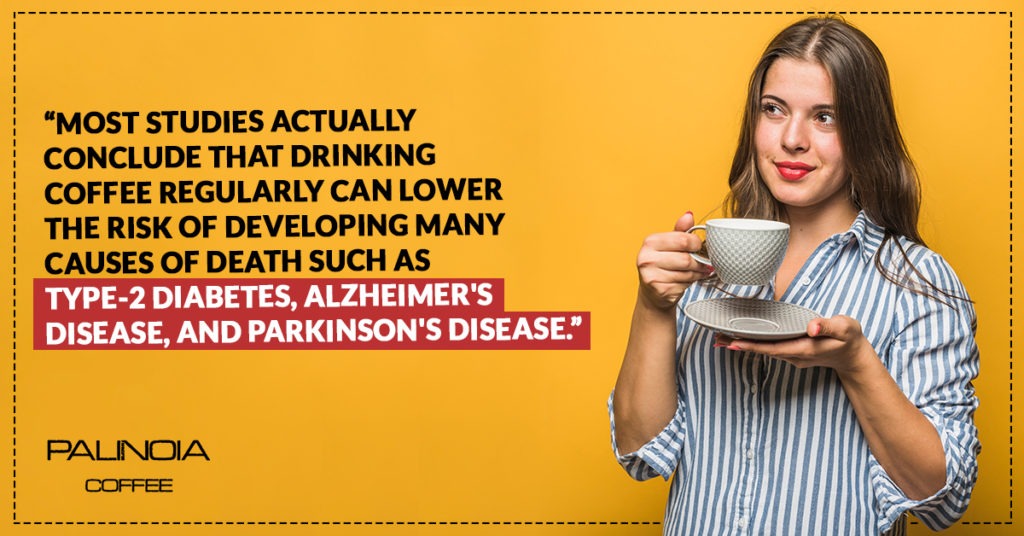Claims of coffee being carcinogenic have been circulating for decades. However, not a single individual or entity has ever been able to provide concrete proof of these claims. To finally resolve whether or not such claims have any basis or not, the World Health Organisation has been conducting extensive research about the connection between coffee and cancer, if any. Ultimately, in 2016, WHO revealed that there is no conclusive evidence of any link between coffee and cancer.
The findings of WHO’s study came less than two years after the United States Department of Agriculture gave the coffee industry one of its biggest victories. In 2014, the USDA, in its Dietary Guidelines for all Americans, recommended that Americans should include 400 milligrams of coffee in the daily diet. That’s right. The USDA has determined that coffee is so safe and healthy that it advises everyone to drink three to five cups each day.
Unfortunately, there are still many who believe that drinking coffee can give them cancer. As part of our never-ending campaign to spread awareness regarding the health benefits of coffee, we at Palinoia Coffee highlight the two most important questions about the relationship between coffee and cancer. And we will provide the answers for you based on insights by two of American Cancer Society’s top researchers, Susan Gapstur, PhD, and Marjorie McCullough, ScD.

- What does the research show about the link between coffee and cancer?
- There is no clear association between getting cancer and drinking coffee. In fact, in 2016, the International Agency for Research on Cancer Monographs conducted a review of all known research regarding the link between coffee and cancer and it ultimately concluded that there is no actual proof that coffee is carcinogenic. Most studies actually conclude that drinking coffee regularly can lower the risk of developing many causes of death such as type-2 diabetes, Alzheimer’s disease, and Parkinson’s disease. Coffee has even been found to help prevent the development of certain cancers such as uterine endometrium and liver cancers.
- The IARC Monographs also indicated that there is a huge possibility that coffee was first linked to cancer because of smokers. Cigarette smoke is known to contain numerous carcinogenic substances. And since many smokers drink coffee, coffee may have been mistakenly linked to tobacco-related cancers. For example, bladder cancer was one of the first types of cancers to be linked to coffee drinking. However, further studies revealed that the patients got cancer not because they were heavy coffee drinkers but because they were heavy smokers.
- What does the research say about whether coffee is associated with a lower cancer risk?
- As studies on the link between coffee and cancer continue, more cancers that can be prevented with coffee are discovered. The most recent cancers that coffee may lower the risk of include; head cancer, neck cancer, colorectal cancer, breast cancer, and liver cancer. It’s been found that roasted coffee contains several active compounds with anti-carcinogenic properties. The most notable of these compounds are caffeine, flavonoids, lignans, and other polyphenols. These compounds help prevent the development of cancer cells by:
- Increasing energy expenditure
- Inhibiting metastasis
- Inhibiting cellular damage
- Regulating DNA repair
- Reducing inflammation
- As studies on the link between coffee and cancer continue, more cancers that can be prevented with coffee are discovered. The most recent cancers that coffee may lower the risk of include; head cancer, neck cancer, colorectal cancer, breast cancer, and liver cancer. It’s been found that roasted coffee contains several active compounds with anti-carcinogenic properties. The most notable of these compounds are caffeine, flavonoids, lignans, and other polyphenols. These compounds help prevent the development of cancer cells by:
We at Palinoia Coffee endeavour to clear away any doubt Australians may have about coffee by providing research-based facts on the health benefits of drinking coffee. We continuously strive to improve our natural coffee products with the ultimate goal of making the best coffee in the world.
